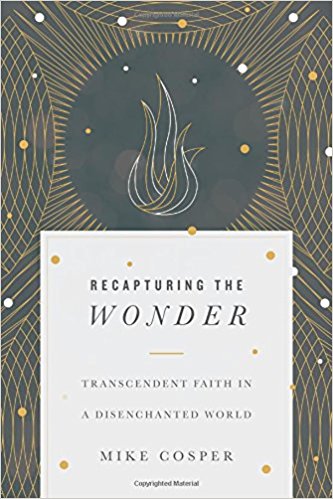Life with(out) God in the 21st Century
If the Bible has ever felt like a dead book instead of ‘the living and active Word’ that you believe it to be; if prayer feels like you are talking to yourself despite your belief that God is real; if talking about your faith feels more fruitful than actually practicing your faith, then Mike Cosper wants to tell you why—and what you can do about it.
 Cosper is the founder of Harbor Media and a former pastor at Sojourn Community Church in Louisville, KY. His latest book, Recapturing the Wonder: Transcendent Faith in a Disenchanted World (Downers Grove, IL: InterVarsity Press, 2017), is “an attempt to sketch out the spiritual landscape of an age that has been called ‘a secular age’ … and an effort at finding a path into a different way of life” (4).
Cosper is the founder of Harbor Media and a former pastor at Sojourn Community Church in Louisville, KY. His latest book, Recapturing the Wonder: Transcendent Faith in a Disenchanted World (Downers Grove, IL: InterVarsity Press, 2017), is “an attempt to sketch out the spiritual landscape of an age that has been called ‘a secular age’ … and an effort at finding a path into a different way of life” (4).
Each chapter pulses with the rhythm of observation, diagnosis and prescription, saving the last of the three for chapter-specific appendices called “pathways” (cf. Jeremiah 6:16). The suggested spiritual disciplines in each pathway are offered as a means—but not the means—of cultivating practices that reinforce one’s faith in a faith-hostile world. Cosper is careful to remind us that each of these is “not a pathway to pleasing God, but a pathway to experiencing the joy of God that is already ours in Jesus” (149).
In a world drained of transcendence, there is only the approval of the mob to fill the void.
Discovering Our Disenchantment—and Doing Something about It
The first chapter diagnoses the problem central to the book. Christians now find themselves living in “a secular age,” one in which God and religion seem superfluous because we have been programed to live as if “the world is [only] what we can see, touch, and measure, and any thought or idea that runs against that expectation is met with resistance” (10).[1] The pressure of these circumstances forces us to choose: we can either demystify the Scriptures or re-enchant the cosmos. The former is not an option for Christians. The latter requires that we recognize the problem of disenchantment and reorder our lives around a different story, namely, the theocentric story of the transcendent Creator ‘in whom we live and move and have our being.’
The second chapter is worth the price of the book, and it really should be required reading for everybody. Cosper shows that religion is not just the wrong reaction to sin; it is part of how sin came into our hearts in the first place. Now we long for God’s love and acceptance, “[b]ut in a world drained of transcendence, there is only the approval of the mob to fill the void” (39). Cosper recommends the Prayer of Examen to foster a deeper awareness of our sin as well as the grace that fully ours in Christ. Oh, and turning off social media can help, too.
The problem highlighted in the third chapter is a loss of assurance that God is with us. We see this problem manifested in the quest for religious hype that characterizes youth camps, revivalism and bizarre mystical experiences. “We’re looking for some kind of assurance that God is still there, that he’ll show up for us in life and death” (65). At the end of hype and spectacle, however, you will only find disappointment and (self-)deception. Instead, Cosper invites us into a world with sacred spaces where the Scriptures are alive and God is real and his Spirit is really with us, even in the mundane, ordinary aspects of life.
In the fourth chapter Cosper tackles the ‘felt need’ to perform, show off or demonstrate our righteousness before others. Instead we must remember “the Father who sees in secret” (Matthew 6:6), and the good news that we do not need to perform for him (cf. Chapter 2). In response to him, Cosper calls us to reduce distractions (which we love, in part, because they distract us from seeing the poverty of our souls) and replace them with periods of solitude and the habit of silence, which can remind us that God sees us, he knows us, and he loves us anyway.
The fifth chapter argues that consumerism is the soul’s desperate, unconscious attempt at creating meaning and identity for itself with “what we wear, what we drive, what we eat” (102). Moreover, the loss of transcendence has left feeling that the products we “need” to craft our identities are hard to obtain. They are expensive. They are scarce. You better buy now, while supplies still last. Here Cosper points us to the God who gives freely, and he calls us to fast regularly from earthly comforts and give freely to remind ourselves that everything we have is a gift from God.
The sixth chapter is another standout, and that’s not just because I love to write about food and faith. Cosper draws from the wisdom and wit of Robert F. Capon, an Episcopal-priest-turned-author and amateur chef, calling us to pay attention to the wonders of the world as we reconnect them to the God who made them all. There is perhaps no better way to spread the wonder than a feast: “A feast takes this world of love and mystery and extends it outward, compounds it with the fearfully and wonderfully made mysteries that make up our friends and family” (132). And every Baptist said, “Amen.”
The final chapter concerns the need for a “rule” of life. Benedict famously had one. So did Calvin. And so should we, Cosper argues, alluding that such a “rule” is the missing piece for so many Christians. “I thought my struggles with faith, doubt and sin could be sorted out if I got the right information,” he writes (139). “[But] we don’t merely need more information. We need to cultivate a way of life that orients us toward [the kingdom of God]” (143).[2]
Minor Quibbles and a Major Commendation
Cosper’s book is wonderfully written and is genuinely moving in places. It is deeply insightful and aptly practical. On top of all this, the author reminds us that even the greatest “saints” of church history were people who never outgrew their need for the grace and mercy of Christ, and Cosper writes as a man who is keenly aware of his own unending need.
Yet there are few weaknesses worth mentioning. First, the author seems to write with cynicism in many of his personal reflections, all but mocking the churches of his upbringing (as well as, bizarrely, the chain-restaurant of his dad’s choosing). This is unfortunate because his criticisms of the evangelical church deserve to be heard, and I fear his sarcasm might turn away various would-be listeners.
Second, Cosper talks about “mystery” in a way that leaves too much room for error. He is right that the over-confidence of a rationalistic fundamentalism is a damning vestige of modernism, and perhaps his comments are best understood as deliberate overstatement aimed at correction. Nevertheless, it seems that inviting a world now ruled by existential sentiments to “embrace the mystery” (118) is a recipe for the second coming of the Romanticists—many of whom not-so-mysteriously became pan(en)theists.
Finally, the book could be greatly strengthened by situating it in the missio Dei. Removed from this framework, the spiritual practices Cosper recommends are easily divorced from the mission Christ has given to his church (which itself is never mentioned). I suppose Cosper would say in reply that he “set out to write a book about spiritual disciplines” (1). Fair enough. Still, I think the nature of the church’s mission actually intensifies the need for such practices. For, as another author says in his solemn assessment the church’s plight in our secular age, “We cannot give the world what we do not have.”[3] Cosper’s book goes a long way toward rectifying that problem, and it is sure to re-awaken the earnest reader to the wonder of life in God’s glorious world.
[1] Charles Taylor’s presence is felt throughout Cosper’s book, where the former is named in the Introduction as one of the central influences on the author, together with Hannah Arendt, David Foster Wallace, and James K. A. Smith, among others.
[2] Cf. Galatians 2:14; Philippians 1:27a, which speak of the necessity of living “in step with the truth of the gospel” and “worthy of the gospel of Christ,” respectively.
[3] Rod Dreher, The Benedict Option: A Strategy for Christians in a Post-Christian World (New York: Penguin Random House LLC, 2017), 19.




No comments have been added.